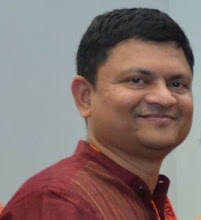Gargi: Yadnyawalkya, since all this world is woven on water, please tell me on what is the world of water woven.
Yadnyawalkya: On the world of wind.
G: And on what is the world of wind woven?
Y: On the world of atmosphere.
G: And on what is the world of atmosphere woven?
Y: On the world of sun.
G: And on what is the world of sun woven?
Y: On the world of moon.
G: And on what is the world of moon woven?
Y: On the world of stars.
G: And on what is the world of stars woven?
Y: On the world of gods.
G: And on what is the world of gods woven?
Y: On the world of Indra.
G: And on what is the world of Indra woven?
Y: On the world of Prajapati.
G: And on what is the world of Prajapati woven?
Y: On the world of Brahman.
G: And on what is the world of Brahman woven?
Y: Gargi, do not question too much about the divinity or else your head will fall off.
-Brihadaranyaka Upanishad, III.VI.1
Brihadaranyaka is one of the oldest Upanishads and certainly the most famous as well as the longest. It features various dialogues with the great philosopher Yadnyawalkya. Most of the women who find representation in the Vedic literature are represented in this Upanishad.
Brahman refers to the absolute (some translations use Hiranyagarbha i.e. the primordial material in place of Brahman and Virij in place of Prajapati in this dialogue). Clearly, questioning is allowed, even encouraged to an extent, but certain questions were taboo.
The Aryanakas and Upanishads tried to do away with the rituals and sacrifices stated in the vedic hymns (and often amplified by the Brahmanas). As a result Aryanakas and Upanishads tend to philosophize more, trying to get behind the reasons of whatever is talked about and done.
I find interesting similarities of this world-upon-world picture with Plato's association of the five Platonic solids with fire/earth/water/air/heaven (Timaeus ca. 350 BC). Incidentally the neolithic people of Scotland developed the five solids a thousand years before Plato (but I do not know of any associations they may have made).
Friday, November 03, 2006
Subscribe to:
Comments (Atom)



